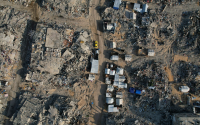12 August 2007Nina Lakhani
Torrential monsoon rains that have killed more than 2,000 people in north-east India, Bangladesh and Nepal in recent weeks are now devastating north-west India and neighbouring Pakistan.
At least 10 people have died and thousands have been left homeless and without electricity, food or clean water after more than 40in of rain fell in India's north-western state of Gujarat last week. Across the border in Pakistan, a week of storms and flooding caused buildings to collapse in the country's largest city, Karachi, killing at least 35 people.
The Indian authorities, already at full stretch after thousands of square miles were inundated in the east, have had to shift resources to help the new flood victims. Helicopters have dropped food parcels in some remote areas, but people are desperate for drinking water as temperatures soar.
"We are hearing that children are dying from dehydration in the villages," said Bharti Lakhani, from Gujarat's port city of Porbandar, where thousands of slum dwellers have been evacuated to schools and hospitals. "My neighbour is helping nearly 50 family members in his small house, because their homes have been flooded."
In the states of Bihar, Uttar Pradesh and Assam further east, rescuers are still struggling to reach 20 million displaced people, despite flood waters starting to recede over the past few days. Children have been seen eating snails and rats in Bihar, and thousands of people throughout the region are still sheltering under plastic sheets while they wait for relief to arrive. In Bangladesh eight million people have been displaced.
The worst threat is from water-borne diseases, since most of the water sources are contaminated or submerged, and people are drinking from puddles and pools to survive. Reports of fatal snake bites are also increasing as animals and humans battle for dry ground, and bite victims are unable to reach medical care.
Many survivors of the floods fear rising debt and hunger as they contemplate the future without homes, crops or livestock. John Holmes, the UN emergency relief co-ordinator, has blamed climate change for the severe rains and called for urgent action to help people living in vulnerable areas cope with extreme weather.
http://news.independent.co.uk/world/asia/article2856872.ece






